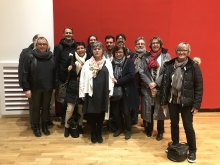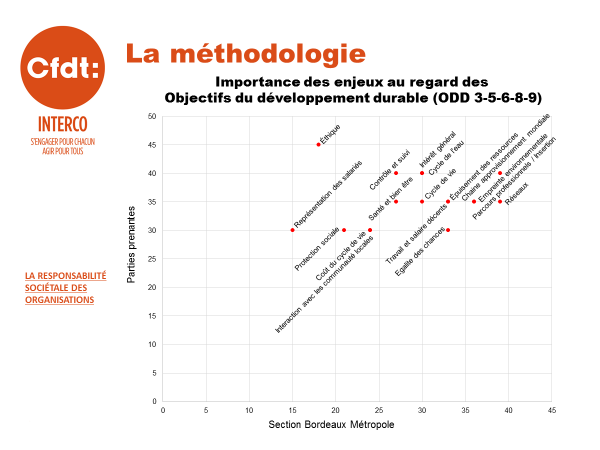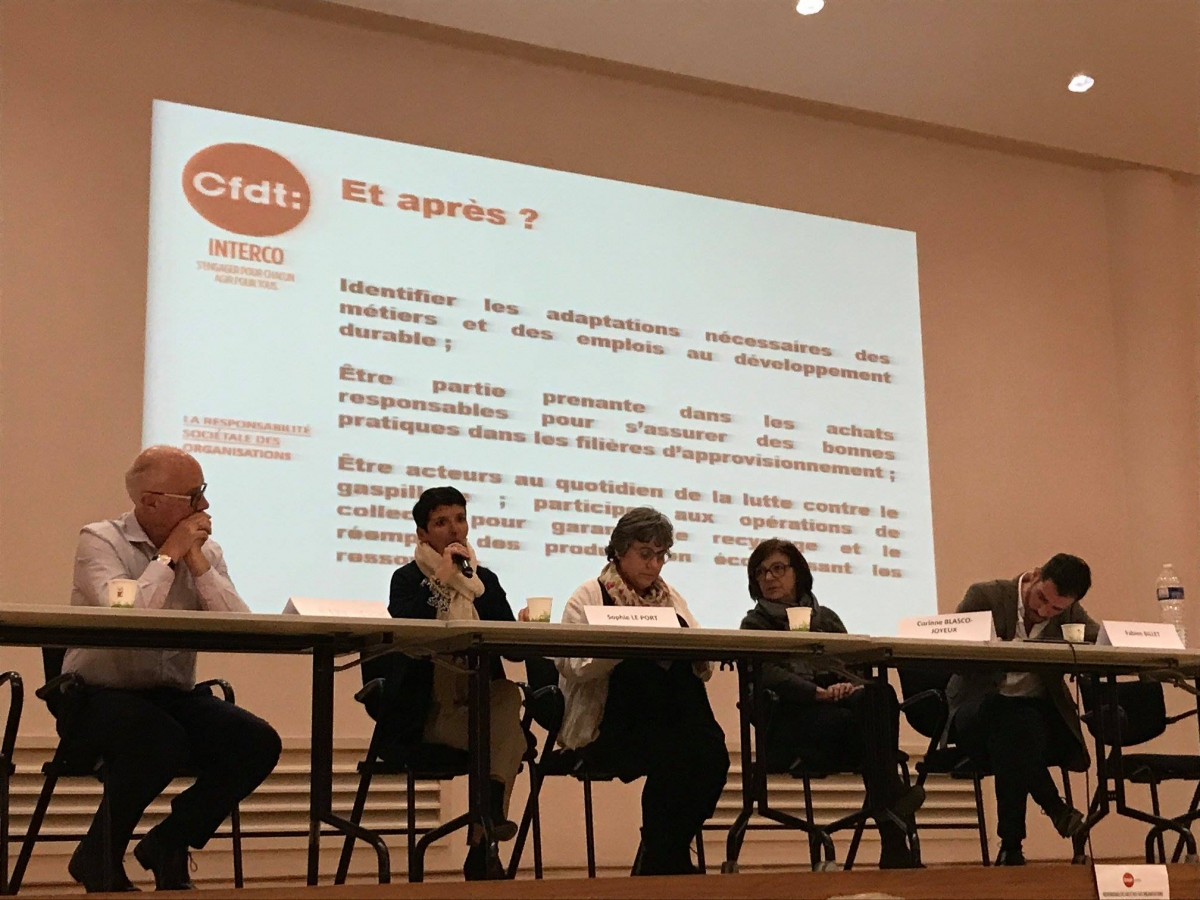Local government officers and members of the CFDT Interco trade union embark on a ground-breaking initiative to promote responsible public procurement in the Bordeaux Metropolitan Region

Article and interviews by the PSI in cooperation with CFDT Interco
Trade unions have an important role in encouraging local authorities to adopt socially responsible public policies
Many unionised local government workers are highly skilled professionals with key roles in the development and implementation of local public policies. Their trade union experience brings additional expertise and an understanding of social issues that can make them useful allies in the daily task of promoting sustainability.
“Public procurement accounts for 10% of French GDP and is a powerful lever for promoting sustainable development. Trade unions can play an important role in the promotion of a development model that protects human rights and the environment. It is essential to monitor and act to ensure that public investment policies are directed at developing a quality economy that meets social standards. We believe that promoting greater social responsibility in public procurement is part of our role as a trade union.
The union gets involved in a project to promote socially responsible procurement
CFDT Interco 33 and its Bordeaux Metropolitan Region branch therefore accepted the challenge of getting involved in the practical implementation of multidisciplinary governance of public procurement. A team of local authority officers and trade union representatives was formed at the end of 2016 to provide new ideas designed to improve public procurement in their local authority. The team was initially formed from among staff involved in public procurement and the circular economy. After the project was formulated at the beginning of 2017, the team wrote to the mayor of the Bordeaux Metropolitan Region, M. Alain Juppé, “to communicate its interest, as a trade union, in becoming a stakeholder in an initiative to promote corporate social responsibility in the field of public procurement”[2] .
Following the mayor's agreement, work began. The trade union team met local authority representatives and chose the contract for laundering the work clothes of local authority employees as the subject for a pilot project. The Bordeaux Metropolitan Region has 6,000 employees and buys many work clothes every year, especially for household waste collection, roads, parks and gardens and cemetery employees. Moreover, the supply chain was local and there was enough time to prepare the project before renewal of the contract was due.
Structured analysis of the social impact of industrial and medico-social laundries
This was done through a Council Decision of 2016 that adopted a system for promoting socially and ecologically responsible purchasing (SPASER), which sets out practical and legally binding objectives for the local authority’s sustainable management of public procurement. Since then, public contracts put out to tender by the metropolitan authority have automatically included social clauses on reintegration and training, gender equality, the prioritisation of short supply chains for catering contracts and the prohibition of chemical fertilisers and phytosanitary products in the management of green spaces.
Mustapha Elouajidi, the Bordeaux Metropolitan Region 's assistant manager for responsible public procurement and a CFDT Interco staff representative manages relations with many suppliers and checks all metropolitan region purchasing orders to ensure that contracts (about 2,000 every year) comply with SPASER sustainability criteria. He authorised meetings between the trade union team and stakeholders and suppliers involved in the relevant sectors.
“When assessing the direct impact of public procurement, it is simpler to deal with local suppliers and communities rather than long supply chains because we cannot directly inspect working conditions in other countries and continents” explains Mustapha. “In the case of long supply chains, we have to rely on certification schemes and trust marks that reduce but cannot exclude the possibility of failures to comply”.
The team of officers/union members conducted a detailed analysis of the work clothes cleaning cycle and the corresponding supply chains to check compliance with social and environmental criteria and identify possible improvements. The methodology consisted of following the laundry supply chain, identifying the most important issues and measuring performance vis-à-vis the 17 SDGs and project objectives. The CFDT Interco team, with the support of the national federation, produced a matrix of the relevant factors for use in the project.

In the case of the laundry contract, the trade union team identified the following SDGs as relevant: SDG 3 (health and well-being), SDG 5 (gender equality), SDG 6 (clean water and sanitation), SDG 8 (decent work) and SDG 9 (industry, innovation and infrastructure).
Identification of social and environmental criteria for the laundry contract
Each relevant SDG was broken down into themes and practical action for the chosen contract. For example, the team, applied SDG 8 (decent work) to the laundries as follows:
- Working conditions (hours, pay, employment contracts, vocational pathways and reintegration, diversity and equal opportunities, etc.);
- Health and safety, equal opportunities;
- Vocational training and reintegration;
- Relations with local communities.
Each goal was assessed according to a scale of priorities set by the group in consultation with stakeholders. This process defined priorities and a roadmap for improvements in the socio-environmental performance of the target contract. The analysis covered the impact of the long and short supply chains. Although the purchase of machines and other products manufactured in factories with decent working conditions using sustainable raw materials can benefit workers and communities in foreign countries, regular cleaning of work clothes in local laundries and their re-use once they have worn out also has a positive impact on local working conditions and the local environment.
The officer/activist team mapped the supply chain of public sector contracts for the cleaning of work clothes. Many services were involved, including:
- Gironde water services;
- Work clothes suppliers;
- Laundries and clothes cleaning services;
- Machine and product manufacturers;
- Labour suppliers.
Meetings with suppliers and other actors in the supply chain
The team requested meetings with and visited suppliers and other economic actors, such as the industrial laundries and laundry associations that employ disabled people, the staff representatives at these companies and associations and the Bordeaux Metropolitan Water Treatment Service. Some were happy to meet them. Others were not so happy, for example, the Bordeaux Laundry Companies Federation, the Gironde Chamber of Commerce and the Water Analysis Laboratory did not respond.
Fabien Billet, CFDT staff representative and procurement manager at the Bordeaux Metropolitan Tramway and Major Infrastructure Department and member of the trade union team explains:
“Some of the actors we contacted were initially very surprised to get a visit from the union on an issue that was not directly linked to working conditions. Some were defensive at first, but there was a visible change in attitude once we had presented our project. They proved willing to discuss the issues and provide the information we asked them for when they realised we were interested in sustainability in a holistic way and that, at the end of the day, we were there to assess and improve public policies at the local government level”.
Using a participatory and co-operative approach, the team asked the suppliers to place the issues that had been identified in their activities in one of the following categories: not relevant, relevant, important, very important and essential. The team and the suppliers agreed on many issues, with the others remaining the subject of negotiation.
Conference on the role of the unions in responsible public procurement, Bourse du Travail, Paris 12 March 2019
Alain Vergne (Bordeaux Metropolitan Regional administration), Sophie Le Port (Bordeaux Metropolitan Region employee and CFDT Interco 33 member), Blanche Fasola (CFDT Interco Federation), Corinne Blasco-Joyeux (Bordeaux Metropolitan Region employee and CFDT Interco 33 member), Fabien Billet (Bordeaux Metropolitan Region employee and CFDT Interco 33 member)
Meeting with the Bordeaux Metropolitan Region’s procurement manager and decisions on actions

The improvements agreed by the trade union team and suppliers were presented to the Bordeaux Metropolitan Region procurement departm“We needed a year and a half to complete the project” continues Fabien. “We then asked for a meeting with the local authority, presented the results of our work and approached the operational manager responsible for awarding the new contract”.
-
Hourly price per kilo of clothing cleaned (evaluation of productivity and pace of work);
- Level of subcontracting (to prioritise suppliers who put the emphasis on direct employment, which is generally better quality);
- Percentage of fixed term and temporary contracts compared to open-ended contracts in the laundries (to prioritise suppliers who put t
he emphasis on permanent employment rather than precarious employment and who are conscious of the need to maintain workload at a reasonable level);
- Level of absenteeism during the last three years, and the severity of problems causing absenteeism;
- Proportion of local workforce and vocational reintegration / apprenticeships;
- Suppliers’ compliance with collective agreements.
Environmental indicators:
- Water treatment system used;
- Ingredients, sustainability and biodegradability of cleaning agents;
- Machine water consumption rate;
- Source of supply for machines;
- Origin and traceability of the fibres and raw materials of the textiles;
- System for reusing worn-out work clothes;
- Recycling and reuse of materials.
“This initiative is very innovative and needs some time to be assimilated and subjected to a legal assessment. The local authority did not have enough time to include everything in the new laundry contract put out to tender, but we are hopeful that the authority will include our ideas in future contracts” concludes Fabien.
Initiative appreciated and validated by the local authority
The Bordeaux Metropolitan Regional authority appreciated the initiative and recognised that the union could contribute to formulating a response to social and environmental issues, not only within the local authority in which they represent the employees, but also in the development of local policies on sustainability, the circular economy, employment and other issues.
Alain Vergne, Bordeaux Metropolitan Region’s assistant manager for public procurement explains:
“The union representatives came to us with their tools, skills and a practical and structured proposal for a pilot project about managing the social and environmental impact of the laundry contract. We quickly seized on this opportunity and we will use the laundry contract pilot study to develop a different approach to the contract next time we put it out to tender”. The CFDT Interco is the only stakeholder that has a representative on the Bordeaux Metropolitan Region steering committee on innovation and public procurement, which is composed of city and metropolitan region councillors. “The trade union team will present the project and its results to councillors at the next committee meeting”, he says.
The initiative will also try to raise the awareness of local authority employees about sustainability issues related to their work clothes with a view to increasing their cooperation in the process. It is essential that employees’ work clothes are cleaned at the laundries and not at home, not only for environmental sustainability reasons but also because the clothing may carry pathogens, dangerous chemical substances and other contaminants (for example, the clothing of street cleaners and cemetery workers). Some employees prefer to clean their clothes at home to make sure they can continue to wear the same clothing.
The circular economy dimension of the project also aims to encourage improvements in work clothes collection rates using a system of traceability by barcode and appointing more staff to collect and store clothes. Problems or damage to clothes are indicated when they are sent to the laundry for repair and cleaning.
First trade union assessment of the initiative
The importance of the trade union approach taken by the local authority officers in efforts to improve and innovate in public procurement social responsibility is clear.
“If we had taken this initiative solely as employees rather than as trade unionists, we would not have had these results. We drew on our union experience when visiting the laundries and in discussions with stakeholders on working conditions, company processes, contract compliance conditions, etc. Local authority employees would do things differently and would need to comply with regulations covering relations between the purchaser and the supplier” explains Fabien.
The trade union approach makes the contracts awarded by local authorities more sustainable. Corinne Blasco-Joyeux, CFDT staff representative and inventory manager for the Bordeaux Metropolitan Region explains: “Normally our union activity focuses on working conditions and employment rights. This sustainability initiative has allowed the creation of a group within the branch that has highlighted the importance of both our trade union and professional skills for improving a local authority public policy. It is another aspect of our trade union work that is different to our grassroots organising and it arouses a lot of interest among activists in the workforce. It has allowed us to get together and contribute directly to resolving current sustainable development issues in our day-to-day work”, she adds.
“As a trade union, we have a role to play in educating and raising the awareness of employees about sustainable development and the positive effects it can have. We can also help to raise the awareness of city councillors and the local authorities”, adds Fabien. François Fournier, CFDT staff representative and public procurement manager for Bordeaux Metropolitan Region says: “As an employee, I am really interested in this initiative, because it shows that we can take practical action in our day-to-day work and this makes our work more rewarding”. The teams’ enthusiasm was another factor in the pilot project’s success. “The project involved an enormous amount of work: it takes a lot of time, but we carry on, one step at a time. We have done most of the work in trade union facility time”, explains Mustapha.
Another reason for the project’s success was that the team actively sought to learn and seek inspiration from the sustainability strategy and methodology of others, such as a local office furniture company. This allowed the team to refine and develop the methodology used by the CFDT Interco team on public sector contracts with industrial laundries.
One of the main challenges was to reassure the companies prior to team visits. In this context, the facilitating role played by the local authority administration was important. Its involvement dispelled the fears of suppliers about the initiative thanks to the mutual trust developed during their business relationship. “That was indispensable for ensuring access to suppliers” says Moustapha. The suppliers understood that the initiative was not an ‘inspection’ in disguise, but that it was a trade union effort, supported by the local authority, to further the development of CSR and that it aimed to improve suppliers’ practices and not sanction them. The consent and support of the local authority is therefore important in ensuring the success of this kind of initiative as is its willingness to implement strategies to optimise social and environmental performance.
Recommendations and next steps
In order to give continuity to the work, the Bordeaux Metropolitan Region CFDT Interco 33 union branch now wants to investigate the textile sector and its world supply chain, while also addressing the circular economy. It has begun to look in detail at the origin of the fibres, their manufacture and what do with used work clothes, reflecting on how to optimise their collection, recovery and recycling. One component of the work concerns the emergence of new kinds of job and potential employment, particularly local, in the circular economy.
“The union has a role to play in making employees agents of change and increasing the accountability of the local authority on these different issues” says Fabien.
There is still a job to be done in terms of highlighting the value of this work, publicising it systematically and raising the awareness of employees, citizens and city councillors. This is an important stage of the project and is needed to ensure the work continues in the future and facilitate its dissemination and replication. It may also help to increase union membership among local authority employees. The next stages should also address making the CSR issue a permanent feature of the local authority, irrespective of its political complexion. It should also seek to involve other CFDT federations in their respective sectors. And, of course, we must have a look at other public sector contracts.
“There is potential to apply this methodology and for trade union teams to look at other contracts, such as creche, sanitation, casino, construction, canteens, vehicles and information technology services “concludes Mustapha.ion. It may also help to increase union membership among local authority employees. The next stages should also address making the CSR issue a permanent feature of the local authority, irrespective of its political complexion. It should also seek to involve other CFDT federations in their respective sectors. And, of course, we must have a look at other public sector contracts.
The CFDT Interco National Federation continues to promote its initiatives and train its activists in the local authorities, whatever their jobs, on the methodology tested in the Bordeaux Metropolitan Region. Twenty trade union teams in various local authorities signed up for a national training programme that took place on 6 June and are ready to launch similar initiatives in their areas. One of them is the CFDT Interco 21 branch (Dijon, Côte d’Or), which is looking at the local authority’s paper supply contract. Fabienne Gourlot, secretary of the Interco 21 branch at the Côte-d’Or Departmental Council is eager to get on with the job:
“It is an innovative initiative that allows the union to play a different role in the local authority in addition to sitting on representative bodies. It represents a renewal of social dialogue, a different way of working together, another way of being. It presents another side of trade unionism that shows how it can change, evolve and reinvent itself”.
[1] Établissement public de coopération intercommunale Bordeaux Métropole https://www.bordeaux-metropole.fr/Metropole/Organisation-administrative/Competences-de-Bordeaux-Metropole
[2] CFDT website, “RSE en travaux pratiques”, 30 May 2017 https://bit.ly/2GrTWem

